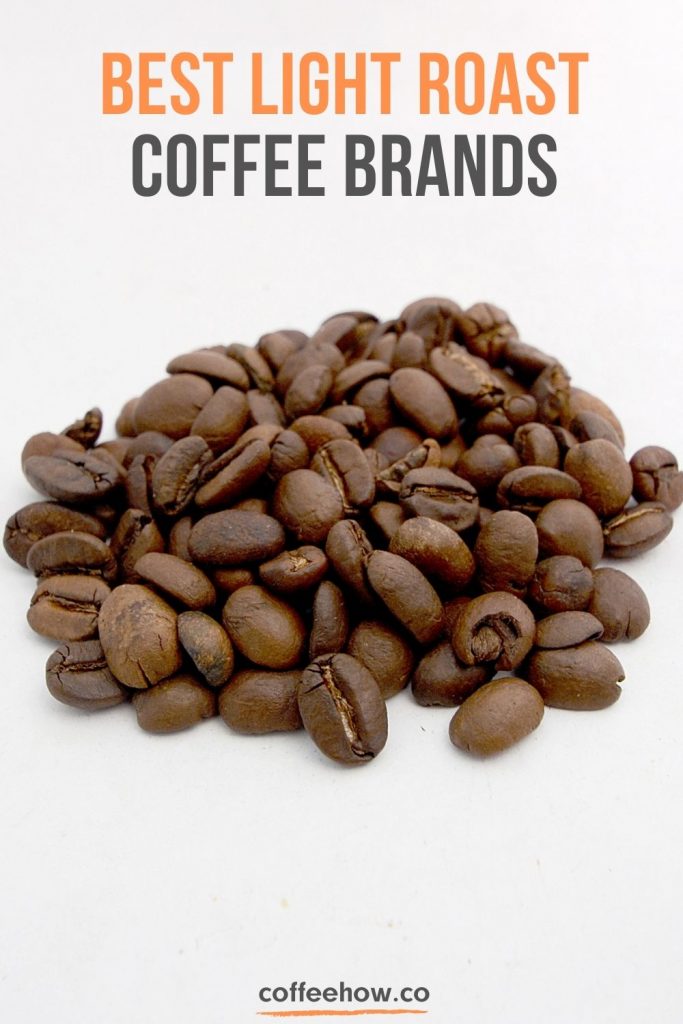fbq('trackCustom', 'view_shop_coffee'); var trackEvent = 'shop_coffee'; It is not a secret, a little of everything…
Dark roasts have ruled the shelves for most of coffee drinking history, but light roast coffee is finally having its moment. Sometimes referred to as blonde roast coffee, lighter roasts are still relatively new on the craft coffee scene.
Coffee fans have quickly grown to love the interesting and unique flavors of these beans. They have distinct tasting notes and exciting aromas that you might not expect to get from a cup of coffee. For this reason, we think light roasts make an exceptional brew.
You may not be as familiar with this type of roast, so we’ll give you a breakdown of what the hype is all about. We’ve compiled a list of some of the best light roast coffee to give you an idea of where to start. Plus, we’ll walk you through the unique characteristics of light roasts, what to look for when you’re shopping, and the actual difference between light and blonde coffee.

In the simplest terms, a light roast refers to beans that are roasted just until light brown in color. The process of gently roasting these beans allows more of the natural flavors to shine through. You’ll get stronger sweet, fruity, and floral flavors out of a light roast than from medium or dark roasts. They also tend to be the most bright, crisp, and acidic tasting of the roast styles.
Light coffee is a newcomer on the coffee scene. Until recently, roasting technology hasn’t quite been good enough to do much besides deeply toast coffee beans. Dark roasted coffee has its own delicious characteristics, but light roasts are a little newer and more exciting right now.
Besides the light brown color of the bean, you can also tell a light roast by its matte surface. Dark and medium-dark roasts tend to be oily because the longer roasting process releases their oils. Light roasts haven’t been cooked long enough to release any oil to the surface.
While you can brew any coffee bean any way you like, light roasts are often brewed as pour over or cold brew. These methods are the best way to appreciate the more interesting flavors of light roast beans.
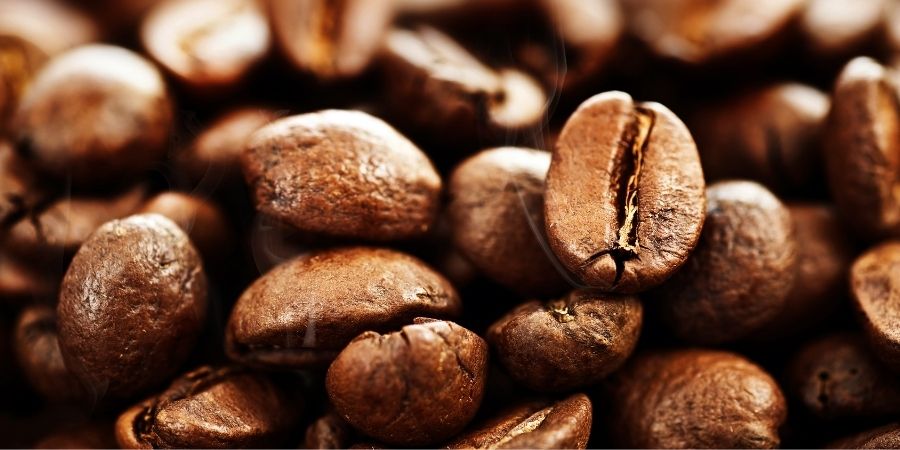
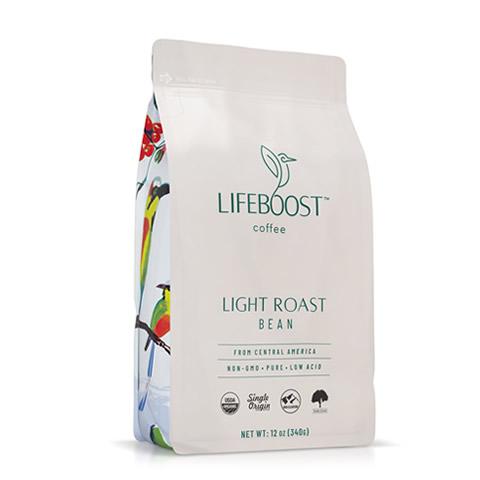
Lifeboost Light Roast is a healthy and high-quality bean. It’s an organic and single origin coffee from the mountains of Nicaragua. These beans have been hand selected and roasted to ensure the best quality and flavor. They’re also shade grown, non-GMO, and Fair Trade. This coffee is delicious, sustainable, and ethical.
The light roast profile creates a bright, flavorful, and pleasantly acidic brew. You’ll notice notes of milk chocolate, caramel, and nuts. There’s even a hint of vanilla in the aroma. These beans work particularly well as a cold brew. That’s because steeping the grounds in cold water for a long period of time helps extract the most flavor.
Since Lifeboost Coffee was founded by a doctor, you’re getting a delicious and healthy brew. They have all of their beans 3rd party tested for toxins, like heavy metals, molds, and pesticides. Plus, they only sell low acid coffee, so it’s easy on your stomach.

Kicking Horse Coffee’s Hola Light Roast is a sweet and fruity blend from Central and South America. It’s bright and acidic, like a good light roast should be. It has rich aromas of brown sugar, nougat, and cocoa power. Combined with tasting notes of juicy red fruit and creamy honey, this coffee is uniquely flavorful.
To bring out the best flavors, you’ll want to try this coffee as drip, pour over, or cold brew.
Kicking Horse’s coffees are shade grown, Fair Trade, and organic. You can rest easy knowing you’re drinking an ethically produced cup of coffee. They expertly roast their beans in their facility along the Canadian Rocky Mountains in British Columbia.
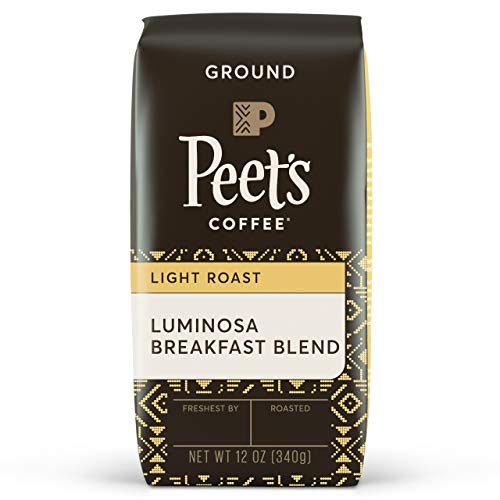
Peet’s Luminosa Breakfast Blend is aptly named since it’s their “lightest and brightest” roast. It’s a blend from Columbia and Ethiopia that highlights the best qualities from each region. It has a great sweetness from the Columbian beans and floral scents unique to the coffee growing regions in Ethiopia. Notes of passionflower, stone fruit, and cacao characterize this brew. It has a delicate aroma and medium, smooth body. Try this one as a cold brew or pour over.
Peet’s Coffee has a long-established record of roasting great coffee. They’ve been sustainability sourcing only the best beans since 1966. Each order is hand roasted in small batches to ensure the utmost freshness.

This Hawaiian Kona Blend from Coffee Bean Direct is a great option that won’t break the bank. Because it’s widely prized as one the world’s best coffees, Kona can be costly. Coffee Bean Direct creates this blend by combining 10% pure Kona beans with high-quality beans from Central America. They’re able to create a delicious blend that matches the flavors and aromas of a 100% Kona Coffee.
These beans are roasted in small batches to bring out a bright acidity and balanced, mellow body. You’ll noticed flavor notes of coriander, macadamia nut, and chocolate.
Coffee Bean Direct concentrates on freshness, affordability, and quality. They’ve been hand roasting and packing their coffee to order from their New Jersey facility for over 10 years.

The Coffee Bros. Light Roast is a great option for fans of espresso or drip coffee. Blending high-quality beans from Keffa, Ethiopia and Nariño, Columbia, gives this coffee a great flavor profile. It makes a crisp and bright brew with honey, citrus, and floral notes. It also has a pronounced sweetness and silky body. Because they freshly roast their beans upon order, you’re always getting the tastiest beans.
As their name suggests, Coffee Bros. was founded by two brothers in Queens, NY. This family company is socially conscious. They make sure to ethically source all their beans from small farms. Plus, they give back 1% of their revenue to plant trees with the organization One Tree Planted.

The Organic Ethiopian Sidamo from Fresh Roasted Coffee LLC is a unique light roast. Because it’s single origin, the distinctive flavors of this bean really shine. It has flavor notes of blueberry, a creamy finish, and a delicate earthiness. With a mild body, fruity acidity, and intense sweetness, this is a complex and bold cup of coffee. Since it’s roasted to order, you’ll get to enjoy this interesting brew at peak freshness.
Founded in 2009, Fresh Roasted Coffee LLC focuses on quality, freshness, and sustainability. Their coffee is organic, Fair Trade, and sustainably sourced. They even have sustainable roasting practices. To reduce their carbon footprint, they use an environmentally friendly roaster to produce all their coffee.

If you need a light roast brew on the go, this one is for you. Pocket Pour-Over is a uniquely-designed single serving that only requires a mug and hot water to make. With outdoorsy folks in mind, it has a built-in paper filter. You can easily brew this delicious coffee on your next camping trip.
This light roast is floral and nutty with notes of citrus fruit. It has a well-balanced flavor, medium body, and light acidity.
Pocket Pour-Over is for and by people who appreciate the outdoors. They donate 1% of all their sales to the National Park Foundation. They also ethically source all their beans and run their packaging facility entirely on wind power.

Real Good Coffee Co. blends and roasts these beans to pair perfectly with your breakfast. This light roast is crisp with a flavorful finish. Originating from Central and South America, these beans have notes of citrus, milk chocolate, and cream. It’s a sweet blend with slightly acidic overtones that are common to light roasts. Any of your favorite brewing methods will work great with this tasty blend.
Real Good Coffee Co. is a small, Seattle-based company. They’ve been roasting for 30 years with an ideology of simplicity. They’re all about freshly roasted, delicious coffee without any frills or gimmicks. Plus, all their packaging is 100% recyclable.

Subtle Earth Organic Light Roast is a rich and chocolatey treat. Coming from the Honduran Marcala region, this coffee has some serious depth of flavor. It has a subtle fruit sweetness with notes of honey, caramel, and cocoa. This is a smooth and super drinkable batch of USDA Organic and non-GMO beans. A velvety body, low acidity, and bright, mild finish make this brew truly stand out. Drip, French press, espresso, and pour over are the ideal methods for brewing these beans.
Subtle Earth Organic Coffee comes from the Don Pablo Coffee company. It’s a family run business that’s committed to quality. They source only the best beans from around the world. Then, they slow roast them in small batches for the ultimate freshness.

Caribou Coffee’s Daybreak Morning Blend is the most affordable option on this list, but that doesn’t mean they’re sacrificing flavor. This bright and tangy light roast is a blend from the Americas and East Africa. It’s floral and fruity with sweet caramel notes and a nutty finish. Like lots of light roasts, it works great as a cold brew, but it’s fantastic served hot too.
Caribou Coffee also doesn’t sacrifice ethics or quality with their affordable coffee. Their beans are Rainforest Alliance certified, meaning they’re sustainably and ethically farmed. They only source the best-quality beans and roast them in a state-of-the-art facility. Roasted in small batches and hand packed in Minneapolis, these beans are a great, affordable option.

Drinking a high-quality light roast is a completely unique experience. It’s nothing like your traditional cup of dark, diner coffee. The complex flavors and delicate mouthfeel can be surprising if you’ve only ever had darker roasts.
Light roast coffees are prized for having the most distinct flavors of any roast type. The gentler roasting process means these beans hold on to their natural characteristics.
You’ll often hear light roasts described as tasting sweet, fruity, floral, bright, acidic, or complex. Some specific tasting notes you can expect in a light roast include honey, vanilla, berry, citrus, chamomile, and rose.
Light roasts tend to have a thinner body. It’s sometimes compared to tea in this regard. The flavors are also a bit more delicate than in their darker counterparts.

There’s some confusion on the question of caffeine content and roast level. Light roasts tend to have slightly more caffeine due to the shorter roasting process. But the real difference in caffeine has to do with how you measure your coffee.
If you measure your coffee by volume (tablespoons), you’ll get more beans in a scoop of light roast. That’s because light roast beans are smaller and denser than darker roasts. If you measure by weight (grams), you’ll end up with about the same caffeine content. The size of the bean is no longer a factor when you’re weighing it.
Another common question is whether light roast beans are more acidic than darker roasts. Light roasts do tend to have more of an acidic flavor. But that’s different than the actual acid content of the coffee. True acid content depends more on where the bean was grown than how it was roasted.

Light, medium, and dark roasts are generally differentiated by their color. But there are lots of other distinct characteristics between these different roast levels.
Light roasts have the most brightly acidic and distinct flavor. They’re lighter in color and denser than darker roast beans. There won’t be any oil on the surface of light beans. They aren’t bitter but more fruity, floral, and sweet. Very light roasts are sometimes called blonde or cinnamon roasts.
Medium roasts are a nice middle ground. Like a light roast, they maintain a good amount of the bean’s distinct flavor. But they’re a bit more balanced and have a fuller body. They also lack the stronger bitterness of a dark roast. These beans can be matte or slightly oily depending on the relative level of roast. A medium roast is usually referred to as City or Full City roast.
Dark roast coffee is smokey, bold, and straightforward. These beans have a stronger bitter flavor without much acidity. They can be quite oily due to the longer and hotter roasting time. This also means they carry less of the distinct flavor of the bean. These roasts are sometimes called French or Italian roasts.
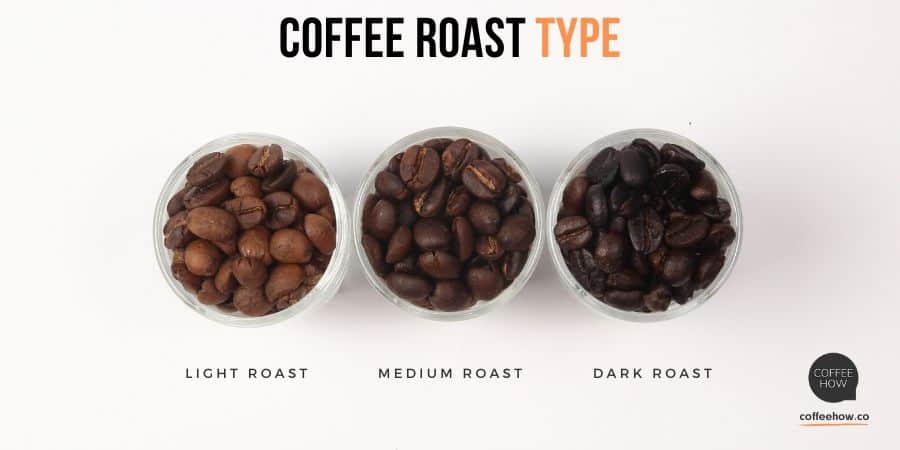

Selecting a light coffee you’ll love can be a little trickier than buying a standard dark roast. Since light roasts display the coffee bean’s natural flavors more strongly than other roasts, there’s much more diversity in flavors. And, unfortunately, it’s a lot easier to get wrong than a super dark and toasty roast. It can be hard to know where to start if you’re new to light roasts. We’ve rounded up some helpful tips for you to consider when shopping for your next batch of beans.

A big factor in selecting the right light roast is to make sure you’re getting high-quality beans. Darks roasts can more easily mask low-quality beans with their smokey, toasted flavors. With a light roast, you’re getting the full profile of the bean. If it’s not a good one, there’s no hiding it. Make sure you’re buying 100% Arabica beans for the best quality.

Along the same lines, you should be sure to buy from a reputable roaster. How and where the bean was grown makes a big difference, but so does the roasting style. Not all light roasts are created equal, and some roasters will inevitably have a better technique than others. Poorly done light roasts can be overly sour, astringent, or one-dimensional.

Another key to picking a good light roast is to pay attention to the flavor notes. These will be much more pronounced than in your average dark roast, so make sure it’s something you like. If you’re not a fan of floral notes, try to find a light roast with more of a fruity or sweet flavor profile. There is a ton of variety to choose from across light roasts, which is why coffee lovers get so excited about them.
Single origin beans are particularly exciting to try as a light roast. You’ll get the full, pure taste of that specific bean which can have some really interesting flavors. Each growing region has its own unique qualities. Beans from Central and South America are often balanced, bright, and sweet. Africa produces more fruity, floral, and earthy beans. And you can expect Indonesian beans to be a little more wild, spicy, and intense. Knowing a little about the origin of your beans can help you better determine which ones you’ll like.
If you have a bad cup of light coffee, don’t let it put you off! Each cup can be a vastly different experience since there’s such a range of flavors. You may have to try a few different kinds before finding one you like. But with so many options, most coffee lovers are bound to find a light roast they love.
While there are tons of exciting options, Lifeboost Light Roast is our pick for the best light roast coffee. It’s bright, flavorful, and pleasantly acidic—exactly what a great light roast should be.
We love that it’s a single origin rather than a blend like some of the other options we listed. That means these Nicaraguan beans have a wonderful depth of flavor. The notes of chocolate, caramel, and nuts make this a super tasty brew.
Plus, we love that Lifeboost is committed to healthy coffee. Every batch is tested to ensure it’s free of toxins, pesticides, and molds. It’s the only option on our list with this type of rigorous testing. If you want the healthiest bean, it’s your best choice.
Lastly, we appreciate that it’s a low acid option. It’s a great choice for light coffee lovers who want to avoid the acidity that’s common in other light roasts.
Whether you try Lifeboost or another light roast from our list, we hope you’re inspired to explore these flavor-packed beans.
Light coffee is best brewed in a way that lets the flavors really shine through. Pour over and cold brew are two ideal methods for getting the most flavorful cup.
Cold brewing any coffee can help make it less acidic. Since the beans aren’t coming into contact with hot water, less acidity comes through.
The roast level of coffee beans doesn’t have much impact on how healthy it is. Instead, you should look into the growing methods of different beans. Some people may worry about the use of chemical fertilizers and pesticides on their beans.
The blonde roast is a type of light roast. Technically, it distinguishes the very lightest roasts. But there’s no standard classification for roast levels across the industry. Depending on the roaster, blonde coffee can vary pretty widely.
